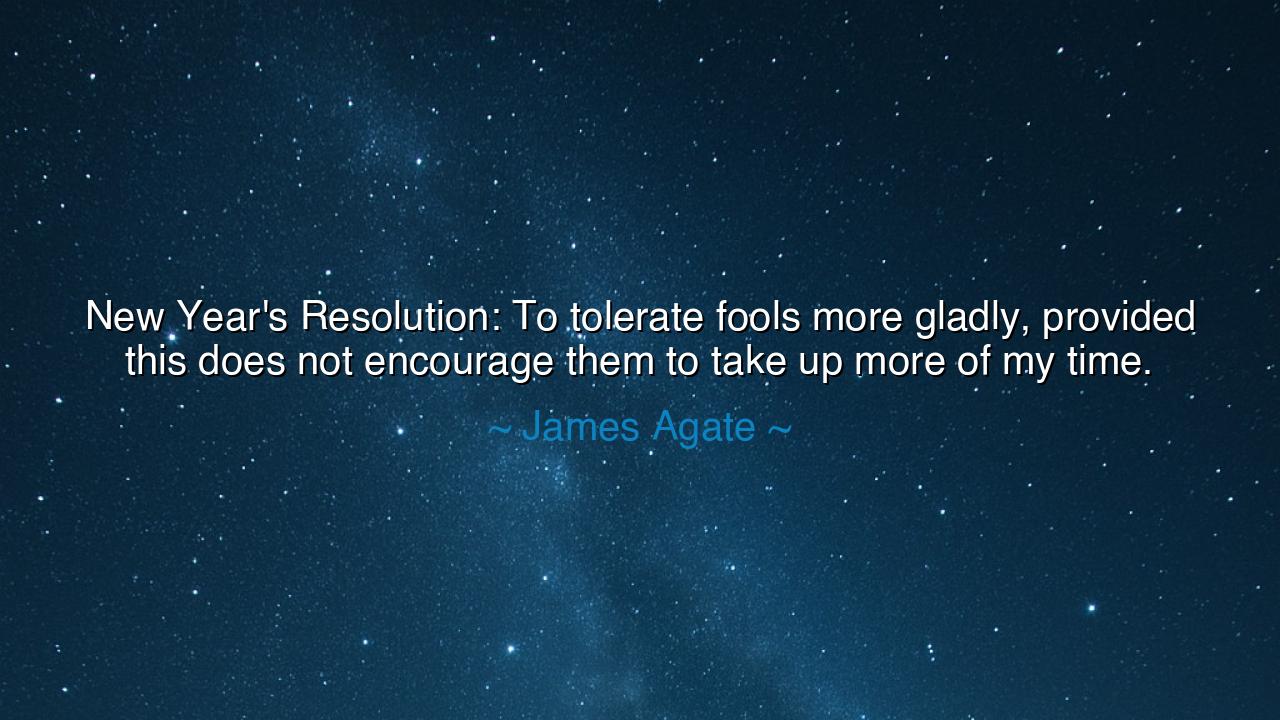
New Year's Resolution: To tolerate fools more gladly, provided
New Year's Resolution: To tolerate fools more gladly, provided this does not encourage them to take up more of my time.






James Agate, the sharp-witted English critic of the early twentieth century, once gave this memorable declaration: “New Year’s Resolution: To tolerate fools more gladly, provided this does not encourage them to take up more of my time.” What may sound like humor is in truth a jewel of wisdom, forged in irony. In it, Agate acknowledges two eternal tensions of human life: the need for patience in dealing with others, and the sacred duty of guarding one’s time, which, once lost, can never be restored.
The meaning of his words rests upon the balance between compassion and discernment. To “tolerate fools more gladly” is to walk the path of patience and civility, to recognize that the world is filled with imperfections, misunderstandings, and ignorance. Yet his caution—“provided this does not encourage them to take up more of my time”—shows the other half of wisdom: to know when indulgence becomes waste. Here lies the paradox of life: we must extend kindness, but not allow ourselves to be consumed by folly.
The origin of such a thought springs from Agate’s life as a critic and diarist. He was surrounded by art, theater, and society, and thus constantly confronted by both brilliance and foolishness. His diaries, rich with reflections, reveal a man both tolerant and impatient—a man who knew that the New Year was a moment not only for lofty aspirations but also for practical boundaries. His “resolution” was no vague promise of self-betterment, but a witty, realistic guardrail for the year to come.
The ancients, too, knew this lesson. Marcus Aurelius, the Stoic emperor, began his Meditations with the reminder that he would daily encounter the ignorant, the arrogant, and the meddlesome. His counsel was to meet them with patience, yet to hold firmly to reason and not be led astray. Agate’s words echo this: patience, yes, but not surrender; tolerance, yes, but not enslavement to another’s folly. Wisdom is the art of measuring tolerance with boundaries.
History gives us the tale of Abraham Lincoln, who, as president, endured endless criticism, mockery, and foolish suggestions from rivals and allies alike. He tolerated much, often with humor and grace, but he also knew when to cut short the chatter and return to the urgent work of preserving a nation. In him we see Agate’s principle in action: the ability to smile at folly, but never let it devour one’s time, energy, or mission.
The lesson for us is clear: life will forever surround us with voices, some wise, some foolish. To become angry at every fool is to live in perpetual misery. To indulge them endlessly is to waste the most precious gift we possess—our time. The art of living is to cultivate patience without passivity, kindness without naiveté, and boundaries without cruelty.
Practical wisdom flows from this. When confronted by foolishness, pause before reacting with anger; let humor and patience guide you. But also learn the art of refusal: say no when your time is being consumed in vain. Protect your hours as a warrior guards his fortress, for once surrendered they cannot be reclaimed. A wise soul learns to walk the middle path, smiling at folly without being conquered by it.
So, children of tomorrow, let Agate’s resolution become your own: be gracious with fools, yet firm with your time. For patience is a virtue, but time is your life’s treasure. To master both is to live not in bitterness nor in waste, but in balance, strength, and clarity. And in this way, each New Year—and each new day—may find you both kinder and stronger.






AAdministratorAdministrator
Welcome, honored guests. Please leave a comment, we will respond soon